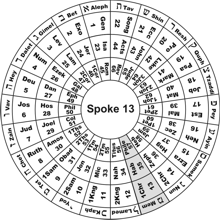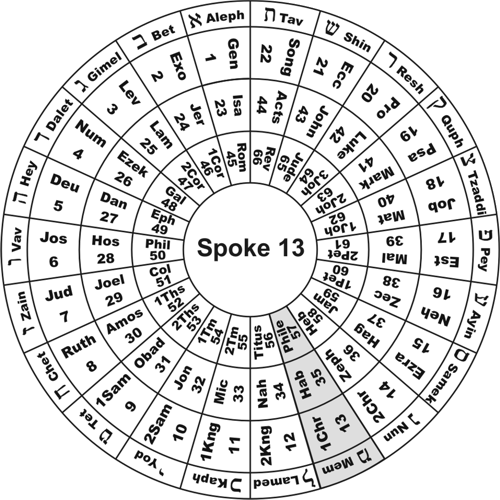For Love's Sake
Yet for love's sake I rather beseech thee, being such an one as
Paul the aged, and now also a prisoner of Jesus Christ.
Philemon 9 (Spoke 13, Cycle 3)
 The
archaic and somewhat quaint word "bowels" appears three times in the tiny book of Philemon, more than anywhere else in the
New Testament. Paul used it with great effect to communicate the depth of his feelings for Onesimus whom he had
"begotten" and whom he called "my own bowels." Hebrew translations always use the KeyWord me'eh for
this word in Philemon and elsewhere, as when Jesus said "rivers of water" would flow from the belly (me'eh) of believers.
This coheres precisely with the discussion above (BW book pg 265). This theme is amplified by
five references to love which also link to the rabbinic tradition The
archaic and somewhat quaint word "bowels" appears three times in the tiny book of Philemon, more than anywhere else in the
New Testament. Paul used it with great effect to communicate the depth of his feelings for Onesimus whom he had
"begotten" and whom he called "my own bowels." Hebrew translations always use the KeyWord me'eh for
this word in Philemon and elsewhere, as when Jesus said "rivers of water" would flow from the belly (me'eh) of believers.
This coheres precisely with the discussion above (BW book pg 265). This theme is amplified by
five references to love which also link to the rabbinic tradition  that
sees love as "the secret of the letter Mem." that
sees love as "the secret of the letter Mem."
Insight from the Gematria Reference: Love = 13 = Unity
The Unity Holograph reveals
the divine integration of the Number 13 with the ideas of Love, Unity
and three of the fundamental Names of God. It is based on this ascending set of
multiples of 13:
| Multiples of 13 and the Shema |
| אהבה (Ahavah, Love) | = 13 |
| אחד (Echad, Unity) | = 13 |
| יהוה (YHVH, The LORD) | = 13 x 2 |
| יהוה אחד (YHVH Echad, The LORD is One) | = 13 x 3 |
| Sum of the Shema | = 13 x 86 |
Rabbi Ginsburgh notes the relation Love = 13 = Unity and declares that this is the
"secret of the Letter Mem" in his
online article.
The Number 86 is the numerical weight of the name of God given in the first verse of Scripture:
אלהים (Elohim, God) = 86
This means that the Sum of the Shema = 1118 = ONE x GOD, and we can see the
meaning of the verse encoded in the intrinsic alphanumeric structure of the
Hebrew language. The profundity of this discovery is further amplified
by the centrality of the verse (Christ said it was the first and greatest
commandment) and its integration with the doctrine of the Trinity (One LORD = 3 x One).
The relation between Love and the Number 13 manifests in the structure of
Scripture in many profound ways - most notably in the 13 verses of the 13th
chapter of 1 Corinthians, the Love Chapter.
The meaning of the Number 13 as Love also manifests as a dominant theme
here in Book 57 (Spoke 13, Cycle 3). Its name,  (Philemon), means "one who kisses." It is from the root
(Philemon), means "one who kisses." It is from the root
 (phileo), meaning to love. This name describes
the content of this little book in which six of its 25 verses (23%) contain the
word love or beloved. This meaning is amplified in the
three occurrences of the the archaic "bowels"
which is a very literal rendering of the Greek way of expressing
deep heart-felt gut-level emotion. Note also that Paul spoke of the bowels
being refreshed, which makes me think of the refreshing Water (Mayim) of Love. (phileo), meaning to love. This name describes
the content of this little book in which six of its 25 verses (23%) contain the
word love or beloved. This meaning is amplified in the
three occurrences of the the archaic "bowels"
which is a very literal rendering of the Greek way of expressing
deep heart-felt gut-level emotion. Note also that Paul spoke of the bowels
being refreshed, which makes me think of the refreshing Water (Mayim) of Love.
In all ways, the little book of Philemon lives up to its name as we witness the
great Apostle Paul begging for the welfare of Onesimus, beseeching Philemon
with every variation on its fundamental theme: for love's sake.
Embraced and Kissed
The names of Habakkuk and Philemon,
which occupy Cycles 2 and 3 on Spoke 13,
are closely associated in the text of Holy Scripture.
The name Habbakkuk comes from the
root  (habuk)
which means to embrace.
Three times in Genesis this word is directly associated with the word
kissed: (habuk)
which means to embrace.
Three times in Genesis this word is directly associated with the word
kissed:
- Genesis 29.13: And it came to pass, when Laban heard the tidings of Jacob his sister's son, that he ran to meet him, and embraced him, and kissed him, and brought him to his house. And he told Laban all these things.
- Genesis 33.4: And Esau ran to meet him, and embraced him, and fell on his neck, and kissed him: and they wept.
- Genesis 48.10: Now the eyes of Israel were dim for age, so that he could not see. And he brought them near unto him; and he kissed them, and embraced them.
In each of these verses, the word translated as embraced is from the same root as the
name Habakkuk. The word translated as kissed is the Hebrew "nashaq" (Strong's #5401).
When these verses were translated into the Greek Septuagint, nashaq became the Greek
 (ephilesen), from the same root as the name Philemon. Thus we see these two
books which are geometrically aligned on the Wheel were already
associated by God in the text of Scripture hundreds of years before the little
book of Philemon was even written (on earth, anyway!)
(ephilesen), from the same root as the name Philemon. Thus we see these two
books which are geometrically aligned on the Wheel were already
associated by God in the text of Scripture hundreds of years before the little
book of Philemon was even written (on earth, anyway!)
Thus we have this dominant theme of Love on
Spoke Thirteen contained in the names of the sequence of books on
the Spoke:
Habakkuk and Philemon = Embraced and Kissed!
The integration goes from the microstructure of the
text of the Shema, to the mid-range structure of the chapters in I Corinthians 13,
to the large-scale structure of the books integrated in the geometry
of the Wheel! And all of this is integrated in the fundamenal theme
of Love, Unity, and the nature of God! Endless wonder!
The Book of Philemon
Here now are all 25 verses of Philemon:
1. Paul, a prisoner of Jesus Christ, and Timothy our brother, unto Philemon
our dearly beloved, and fellowlabourer,
2. And to our beloved Apphia, and Archippus our fellowsoldier, and to
the church in thy house:
3. Grace to you, and peace, from God our Father and the Lord Jesus Christ.
4. I thank my God, making mention of thee always in my prayers,
5. Hearing of thy love and faith, which thou hast toward the Lord
Jesus, and toward all saints;
6. That the communication of thy faith may become effectual by the
acknowledging of every good thing which is in you in Christ Jesus.
7. For we have great joy and consolation in thy love, because the
bowels
of the saints are refreshed by thee, brother.
8. Wherefore, though I might be much bold in Christ to enjoin thee that
which is convenient,
9. Yet for love's sake I rather beseech thee, being such an one as
Paul the aged, and now also a prisoner of Jesus Christ.
10. I beseech thee for my son Onesimus, whom I have begotten in my
bonds:
11. Which in time past was to thee unprofitable, but now profitable
to thee and to me:
12. Whom I have sent again: thou therefore receive him, that is, mine
own bowels:
13. Whom I would have retained with me, that in thy stead he might
have ministered unto me in the bonds of the gospel:
14. But without thy mind would I do nothing; that thy benefit should
not be as it were of necessity, but willingly.
15. For perhaps he therefore departed for a season, that thou shouldest
receive him for ever;
16. Not now as a servant, but above a servant, a brother beloved,
specially to me, but how much more unto thee, both in the flesh, and in the Lord?
17. If thou count me therefore a partner, receive him as myself.
18. If he hath wronged thee, or oweth thee ought, put that on mine account;
19. I Paul have written it with mine own hand, I will repay it: albeit
I do not say to thee how thou owest unto me even thine own self besides.
20. Yea, brother, let me have joy of thee in the Lord: refresh my bowels
in the Lord.
21. Having confidence in thy obedience I wrote unto thee, knowing that
thou wilt also do more than I say.
22. But withal prepare me also a lodging: for I trust that through your
prayers I shall be given unto you.
23. There salute thee Epaphras, my fellowprisoner in Christ Jesus;
24. Marcus, Aristarchus, Demas, Lucas, my fellowlabourers.
25. The grace of our Lord Jesus Christ be with your spirit. Amen.
| 


